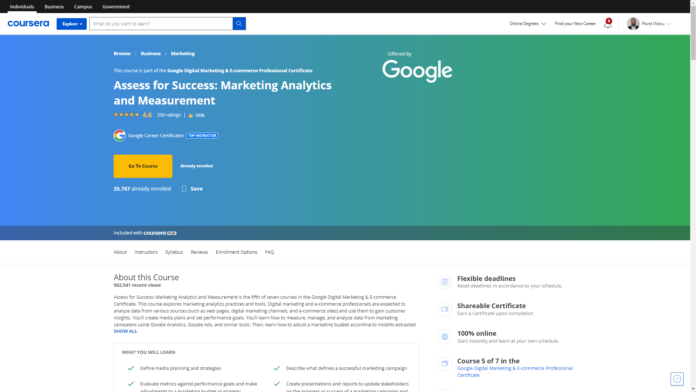About this Course
Assess for Success: Marketing Analytics and Measurement is the fifth of seven courses in the Google Digital Marketing & E-commerce Certificate. This course explores marketing analytics practices and tools. Digital marketing and e-commerce professionals are expected to analyze data from various sources (such as web pages, digital marketing channels, and e-commerce sites) and use them to gain customer insights. You’ll create media plans and set performance goals. You’ll learn how to measure, manage, and analyze data from marketing campaigns using Google Analytics, Google Ads, and similar tools. Then, learn how to adjust a marketing budget according to insights extracted from key metrics. You’ll use A/B test results to optimize a campaign and identify metrics that define a campaign’s success. You will be able to analyze and visualize data and insights in spreadsheets and prepare presentations to share campaign progress or results with stakeholders.
Google employees who currently work in the field will guide you, providing hands-on activities and examples that simulate common digital marketing and e-commerce tasks, while showing you some of the best tools and resources used on the job.
Learners who complete the seven courses in this program will be equipped to apply for entry-level jobs in digital marketing and e-commerce. No previous experience is necessary.
By the end of this course, you will be able to do the following:
– Plan and allocate the spending of marketing budgets
– Describe the unique role of performance goals and key performance indicators (KPIs) in marketing campaigns
– Describe how tools like Google Analytics and Google Ads are used to measure website and ad campaign performance
– Describe how to determine the return on investment (ROI) or return on ad spend (ROAS) of a marketing project
– Prepare, conduct, and analyze the results from an A/B test to optimize a marketing campaign
– Apply spreadsheet features like sorting, filtering, and pivot tables to prepare data to be shared
– Create charts in spreadsheets for visualization of metrics
What you will learn
Define media planning and strategies
Describe what defines a successful marketing campaign
Evaluate metrics against performance goals and make adjustments to a marketing budget or strategy
Create presentations and reports to update stakeholders on the progress or success of a marketing campaign and important insights
Skills you will gain
Digital marketing KPIs
Spreadsheet management
Presenting to stakeholders
Media planning and strategies
Marketing Analytics
Instructor
Google Career Certificates
Offered by
Google Career Certificates are part of Grow with Google, an initiative that draws on Google’s 20-year history of building products, platforms, and services that help people and businesses grow. Through programs like these, we aim to help everyone– those who make up the workforce of today and the students who will drive the workforce of tomorrow – access the best of Google’s training and tools to grow their skills, careers, and businesses.
Syllabus – What you will learn from this course
Week 1
Introduction to Assess for success: Marketing analytics and measurement
You will learn about marketing campaigns and how marketers set performance goals. You’ll also explore media planning and practice creating your own media plan. Finally, you’ll be introduced to common tools used in marketing analytics and how they work.
Week 2
Use metrics from Google Analytics and Google Ads
You will learn about key metrics and data sources from various platforms. You’ll learn how to use the metrics in Google Analytics and Google Ads to gain insights for marketing campaigns. You’ll also learn how to link data from Google Ads to Google Analytics and export data from both platforms for further analysis.
Week 3
Measure the success of marketing campaigns
You will investigate the metrics and outcomes that define a successful marketing campaign. You’ll examine different metrics that help you determine the ROI or ROAS of a marketing project so you can make adjustments to improve returns. You’ll also learn how to plan for and conduct an A/B test to optimize a marketing campaign. Finally, you’ll examine what a successful marketing campaign looks like and what makes it successful.
Week 4
Share metrics and insights with stakeholders
You will learn how to work with stakeholders by anticipating their needs and communicating progress or results from a campaign. You’ll explore how to analyze, filter, and prepare metrics and insights to share with them. You’ll also practice creating visualizations, presentations, and a dashboard to clearly summarize insights for stakeholders. Near the end of the course, you’ll apply what you’ve learned by presenting a set of practice insights to stakeholders
About the Google Digital Marketing & E-commerce Professional Certificate
Prepare for a new career in the high-growth fields of digital marketing and e-commerce, in under six months, no experience or degree required. Businesses need digital marketing and e-commerce talent more than ever before; 86% of business leaders report that digital commerce will be the most important route to growth. There are 218,000 U.S. job openings in this growing field, with a median entry-level salary of $51,000.
Throughout this program, you will gain in-demand skills that prepare you for an entry-level job and learn how to use tools and platforms like Canva, Constant Contact, Google Ads, Google Analytics, Hootsuite, HubSpot, Mailchimp, Shopify, and Twitter. You will learn from subject-matter experts at Google and have a chance to build your own portfolio with projects like customer personas and social media calendars to show to potential employers. 75% of Google Career Certificate graduates in the US report seeing a positive impact on their career within six months² Check out all Google Career Certificates here. This program contains no confidential information. All Google Search features taught are publicly available, you can learn more in official Google Search documentation. ¹US Burning Glass Labor Insight Report salary data (median with 0-5 years experience) and job opening data. Data for job roles relevant to featured programs (4/01/2021 – 3/31/22). Based on program graduate survey responses, United States, 2021
